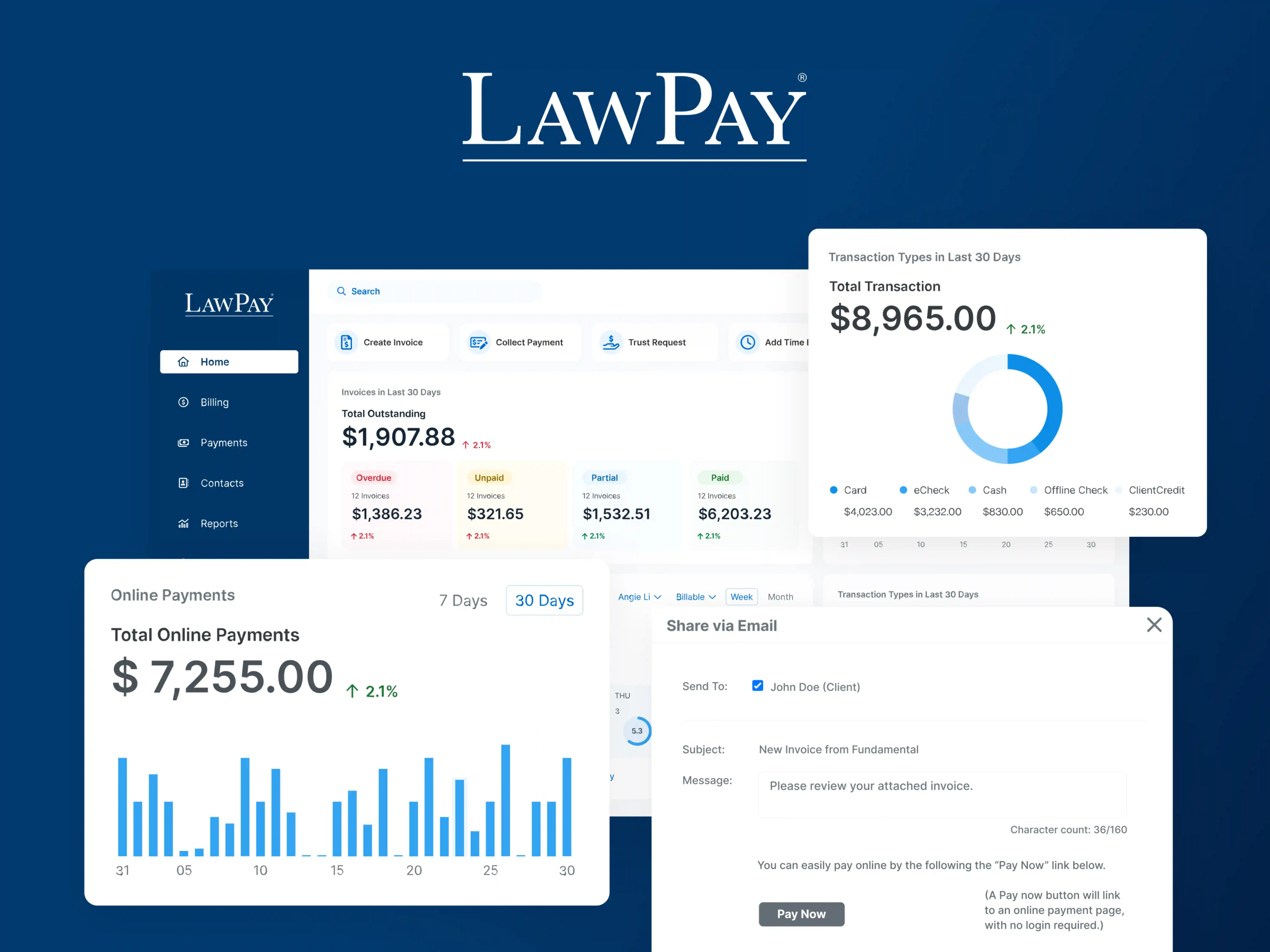Effective law firm financial management is critical to business growth, informed decision-making, and profitability. A disciplined approach to managing your firm’s finances can resolve your toughest operational pain points, such as cash flow volatility, inefficient staffing and resource allocation, and complex, cumbersome billing processes.
As complex and pervasive as these issues are, they indicate opportunity. Even small changes to your financial management processes could streamline operations and unlock new levels of business growth.
This guide explains the essential components of law firm financial management. Use it to identify and remedy inefficiencies, financial bottlenecks, and common barriers to law firm growth.
What Is Law Firm Financial Management?
Financial management is a combination of strategic planning and day-to-day practices that help law firms achieve business success. Using these methods, firm leaders can manage their finances more strategically, covering budgeting, revenue planning, and tools to increase profitability.
In larger firms, a chief financial officer (CFO) oversees financial management. The CFO may have a support staff or accounting team to handle daily tasks like expense tracking. Smaller firms may have a bookkeeper who reports to the lead attorney. Solo lawyers may act as CFO and accounting clerk in addition to their client responsibilities.
Why Correctly Managing Law Firm Finances Leads to Growth
Gaining more clients and increasing revenue are high-level goals for any successful law firm. However, without a solid financial management strategy, achieving large-scale growth can create new challenges.
Productive and healthy growth requires a deep understanding of your practice’s revenue sources, expenditures, and which investments provide the best returns. But getting a clear, detailed view of your firm’s finances can be difficult, especially considering the need to navigate complex trust accounting regulations and maintain IOLTA compliance.
Creating a financial management strategy can help you get a better handle on your practice’s core business metrics and growth potential. This process begins with critically evaluating factors like the firm’s business cycle, profitability, cash flow, and trends in law firm key performance indicators (KPIs).
Analyzing profitability and KPI trends often reveals opportunities to improve efficiency and make smarter investments, such as:
Identifying bottlenecks that can be streamlined or automated with technology. These improvements can justify the cost and elevate the client experience, which in turn drives repeat business and referrals.
Determining which practice areas and case types are most profitable. Shifting your marketing efforts to those areas may deliver better results with a lower budget.
Using financial data to optimize pricing and ensure every case is profitable.
Projecting different growth scenarios based on historical trends, such as expanding your team or increasing your marketing budget.
In short, developing a sound financial plan helps you find ways to optimize processes, serve clients better, generate more consistent cash flow, and grow your business.
Key Components of Effective Law Firm Financial Management
While the benefits of solid financial planning and management are compelling, knowing where to start is a common challenge. Budgeting is the first step. Then comes cash flow management, long-term planning, profitability analysis, and reporting. Let’s review each step in more detail.
Budgeting
Creating a budget is a crucial step in understanding financial performance and establishing realistic profitability and growth targets for the short and long term. Budgeting gives law firms a clear view of their operational expenses and financial capabilities, forming the foundation for sustainable business decisions.
Every law firm’s budget is unique and can vary based on practice area, time in business, and team size. The typical elements of a law firm budget are expenses, revenue sources, capital expenses, or larger purchases like equipment and furniture.
With a comprehensive budget, you can project your firm’s profits and make informed decisions about growth investments. If you also track the firm’s actual performance against the budget, you can identify seasonal revenue and expense patterns, refine future budgets, and better understand the firm’s key profit drivers and financial challenges.
Managing Cash Flow
Maintaining positive cash flow through payment delays and prolonged cases requires proactive planning and strategic billing practices. Finding ways to improve cash flow can be tricky. Lengthy payment timelines are a common challenge. Lawyers who bill in arrears do not get paid immediately for their work. Personal injury lawyers may wait months or years for a settlement to finalize before they collect their fees.
Addressing your firm’s cash flow challenges begins with tracking. By documenting and reviewing your short-term cash flow patterns, you can identify problems and opportunities for improvement.
For example, you may learn you are undercharging for your law firm’s consultation fees. In response, you could increase your rate or spend less time on consultations. Or, you may find that lengthy delays in preparing and sending client invoices are negatively impacting collections.
You can address billing bottlenecks by implementing modern legal billing software. A premier legal billing application improves the way law firms accept payments and automates much of the accounting process. Faster invoicing shortens the gap between services rendered and cash collected. It can also free up time for serving clients and developing winning case strategies.
Long-Term Planning
Long-term planning helps law firm leaders anticipate delayed revenue, manage liabilities, and sustain growth, even through unpredictable caseloads. This process typically focuses on financial situations that could affect the business for a year or more. Examples include:
Hiring new associates or paralegals: Your growth plans may involve a gradual staffing increase that coincides with new client acquisitions. Costs to consider are salaries, benefits, technology licenses, hardware, and paid training. And, when planning for caseload capacity growth, remember to account for learning curves. A new lawyer may not be effective with a full caseload on their first day.
Expanding to additional office locations: Geographic expansion will require budgeted funds for lease agreements, hardware and software, furniture, signage, staffing, and marketing.
Investing in firm-wide technology upgrades: New software for billing, CRM, and case management comes with licensing and subscription costs. There may also be expenses related to downtime or training.
Launching new practice areas: Expanding the firm’s practice area will require investments in staffing and marketing. Resource-heavy fields like class action or mass torts require particularly detailed planning.
Accepting long-duration cases with delayed payouts: Contingency cases often require long-term planning because the payout can be months or years after you accept the case. Estimate the timing and costs of salaries and other expenses needed to resolve the case. The potential financial impact of not securing a settlement for your client should also be taken into consideration.
Saving for tax season or annual dues: Advance planning is recommended for large annual expenses like taxes, malpractice insurance renewals, and bar association fees for large teams.
Long-term planning often overlaps with firm productivity goals. Learn how to maximize efficiency with this legal productivity guide.
By accounting for larger expenses and delayed payments in your financial plan, you’ll have a clearer picture of the financial growth targets your firm will need to reach to fulfill obligations and achieve profit goals.
Profitability Analysis
A profitability analysis is a detailed review of the revenue, time, and expenses associated with each aspect of the work your firm performs. Understanding law firm profitability helps leaders optimize time, improve realization rates, and boost revenue without overextending staff.
Metrics to review in a profitability analysis include the utilization rate of lawyers and staff, total hours worked compared to billable hours logged, and the firm’s realization rate (the percentage of revenue you actually collect relative to the amount you could have earned, factoring in discounts and unpaid invoices). You may also evaluate time spent on billing and collections, administrative tasks, or other daily processes.
The ultimate goal of performing a profitability analysis is to find ways to increase efficiency and utilization without sacrificing client satisfaction or your staff’s well-being.
Financial Reporting
Financial reporting helps law firm leaders assess the firm’s fiscal health, meet compliance obligations, and make data-driven decisions. Done correctly, reporting provides a snapshot of profitability, spending, and long-term viability.
These are the key financial reports for law firms:
Profit and loss statement (P&L): Also known as an income statement, the P&L shows revenue, expenses, and net profit for a set period.
Balance sheet: A balance sheet itemizes the firm’s assets, liabilities, and equity as of a point in time. The relative amounts of these categories are indicators of financial health. For example, cash and accounts receivable balances show the funding available for short-term liabilities. And, the firm’s total debt relative to equity shows how reliant the firm is on debt to fund operations.
Cash flow statement: The cash flow statement shows the uses and sources of cash. It also shows how the P&L activity affects the balance sheet.
Budget vs. actual report: This report compares forecasted revenue, expenses, and profit to actual performance. You can use it to identify unrealistic budgets and to refine forecasts.
Trust/IOLTA account reconciliations: Trust account reconciliations ensure client funds are managed legally and ethically. Regular audits are necessary for maintaining compliance.
Retained earnings statement: The retained earnings statement shows the amount of net profits kept in the business, cumulatively and for the most recent period. It also shows dividends distributed to owners in the most recent period. A high retained earnings balance signals financial health and represents funding available to reinvest in the business.
Most of these reports are structured to conform to U.S. Generally Accepted Accounting Principles (GAAP). These standards ensure consistent, compliant financial tracking—especially important for firms with external reporting obligations or long-term growth plans.
How Different Billing Models Affect Financial Planning
Financial planning practices vary by billing model, such as flat fees, hourly rates, retainer, or on contingency. How you bill clients affects revenue flow and predictability, as well as the strategies required to remain solvent.
Key points to note for each billing model are:
Flat fee billing: Flat fee billing structures are easy for clients to understand, but they can result in inconsistent profitability. An advantage is that flat-fee arrangements are usually billed upfront. Your firm may optionally choose to offer legal fee financing or payment plans for clients with tight budgets. Some cases will require more resources than others, so expense budgeting is critical.
Hourly billing: Hourly bills are sent in arrears, often monthly. Reducing payment timelines is a priority. Revenue can be inconsistent, and accurate invoicing requires detailed timekeeping by the legal staff. Time tracking software may be necessary.
Retainers: Retainer fees are billed upfront with balances topped off as needed. As with hourly billing, detailed timekeeping is important. Staff must track earned and unearned revenue carefully.
Contingency fees: Contingency fees offer the least visibility into future revenues. Amounts and timing of collections are unpredictable. Some cases may settle quickly while others can take months or years to resolve. Careful expense planning and ample funding are required so the firm can continue meeting its obligations.
Forecasting for Contingency-Based Firms
Contingency-based law firms face unique forecasting challenges due to irregular revenue and unpredictable case outcomes. This section explains how to adapt financial forecasting methods for these practices.
Law firms that bill flat fees or retainers can review payment schedules and case milestones to predict expected revenues over the next month or year. Lawyers who bill on contingency don’t have the same luxury. They know they will receive their fees upon securing compensation for their client, but the amount and timing of that compensation are often uncertain.
Still, there are methods for developing financial forecasts despite the uncertainty. Here are the steps:
Evaluate case history: Review case values, win rates, and timelines. These variables may differ by client type or other factors. Make as many conclusions as you can from the data you have, and then refine your findings as you finalize more cases.
Review your case acceptance criteria and valuation method: In light of your case history, review how you evaluate new cases. Look for opportunities to refine your methods, according to business needs. You want strong cases, but you may prefer settlement opportunities rather than issues likely to go through a lengthy trial process.
Create timelines: Map out milestones for each active case and create a general timeline for new cases.
Project and refine: Using your timelines and expected case values, project expected revenues. Remember to consider any fee split you may owe to a referring attorney. Add in expenses. Confirm you have enough cash on hand to cover expenses between collections. Refine your projections as your case work develops.
Why You Should Use Legal Payments Software for Financial Management
Law firm finance is complex, whether you’re a big firm with a dedicated accounting team or a small, independent practice. Thorough financial management encompasses budgeting, analyzing financial performance, invoicing, collecting payments, reconciling trust accounts, and planning for the future. These are all essential but non-billable tasks.
Leading law firms opt for technology that brings accuracy, compliance, and efficiency to the accounting process. A reputable, cloud-based billing and payments application like LawPay can eliminate manual work, improve invoice accuracy, impress clients, and streamline accounts receivable management. It also makes it easy for the firm to begin accepting credit card payments.
Dedicated legal payment platforms support full compliance with IOLTA rules and include time-saving features for optimizing a law firm’s financial management practices. For example, you can combine operational and financial data via integrations with frequently used accounting software and case management solutions. You can then use the combined data for forecasts, reporting, budgeting, and more.
Improve Your Firm’s Financial Health with LawPay
Schedule a demo to see what LawPay can offer your firm.
Book Now
LawPay, a premier legal billing and payment application, is trusted by thousands of lawyers and law firms nationwide. Teams use LawPay to streamline administrative tasks, offer alternate payment methods that today’s clients demand, and get paid faster.
Schedule a demo today to see how LawPay’s advanced billing and payment features can contribute to a healthier financial future for your firm.
About the author

Catherine BrockContent Writer
Catherine Brock is a Content Writer for leading legal software companies, including MyCase, Docketwise, CPACharge, CASEpeer, and LawPay—the #1 legal payment processor. She covers emerging legal technology, financial wellness for law firms, the latest industry trends, and more.
